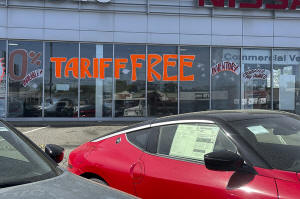Spike in steel tariffs could imperil Trump promise of lower grocery
prices
[June 02, 2025] By
MATT SEDENSKY
NEW YORK (AP) — President Donald Trump’s doubling of tariffs on foreign
steel and aluminum could hit Americans in an unexpected place: grocery
aisles.
The announcement Friday of a staggering 50% levy on those imports stoked
fear that big-ticket purchases from cars to washing machines to houses
could see major price increases. But those metals are so ubiquitous in
packaging, they’re likely to pack a punch across consumer products from
soup to nuts.
“Rising grocery prices would be part of the ripple effects,” says Usha
Haley, an expert on trade and professor at Wichita State University, who
added that the tariffs could raise costs across industries and further
strain ties with allies “without aiding a long-term U.S. manufacturing
revival.”
Trump’s return to the White House has come with an unrivaled barrage of
tariffs, with levies threatened, added and, often, taken away, in such a
whiplash-inducing frenzy it’s hard to keep up. He insisted the latest
tariff hike was necessary to “even further secure the steel industry in
the U.S.”
That promise, though, could be at odds with his pledge to reduce food
costs.
Rising grocery prices, Trump has said, were among the biggest reasons
voters swung his way. A look around a supermarket makes clear how many
products could be impacted by new taxes on steel and aluminum, from beer
and soda to dog food to can after can of beans, fruit, tomato paste and
more.

“It plays into the hands of China and other foreign canned food
producers, which are more than happy to undercut American farmers and
food producers,” insists Can Manufacturers Institute president Robert
Budway. “Doubling the steel tariff will further increase the cost of
canned goods at the grocery store.”
Budway says production by domestic tin mill steel producers, whose
products are used in cans, have dramatically decreased in recent years,
making manufacturers reliant on imported materials. When those prices go
up, he says, “the cost is levied upon millions of American families.”
Food companies were already warily assessing the administration’s
tariffs before the latest hike, which Trump said would go into effect on
Wednesday. The Campbell Co., whose soup cans are a staple for millions
of Americans, has said it was working to mitigate the impact of tariffs
but may be forced to raise prices. ConAgra Brands, which puts everything
from cans of Reddi-Whip to cooking sprays like Pam on supermarket
shelves, likewise has pointed to the impact steel and aluminum tariffs
have.
[to top of second column] |

A Tariff Free sign to attract vehicle shoppers is at an
automobile dealership in Totowa, N.J., on April 30, 2025. (AP
Photo/Ted Shaffrey)
 “We can’t get all of our materials
from the US because there’s no supply,” ConAgra CFO David Marberger
said at a recent Goldman Sachs conference on global staples.
Beyond the obvious products — canned foods like tuna, chicken broth
and cranberry sauce — economists warn of a spillover effect that
tariffs can have on a gamut of items. If the cost to build a store
or buy a truck to haul food rise, the prices of products may follow.
Most Americans will never buy a tractor, but Babak Hafezi, who runs
a global consulting firm and teaches international business at
American University, says a price spike in such a big-ticket item
vital to food production will spill down to all sorts of other
items.
“If a John Deere tractor costs 25% more, consumers pay the price for
that,” Hafezi says. “This trickles down the economy and impacts
every aspect of the economy. Some of the trickling is immediate and
others are slower to manifest themselves. But yes, prices will
increase and choices will decrease.”
Trump appeared before a crowd of cheering steelworkers to unveil the
new tariffs at a rally outside Pittsburgh. In a statement, David
McCall, president of the United Steelworkers International union,
called tariffs “a valuable tool in balancing the scales” but “wider
reforms of our global trading system" are needed.
It may be harder to gauge the weight of tariffs on, say, a can of
chickpeas versus that of a new car, but consumers are likely to see
myriad indirect costs from the levies, says Andreas Waldkirch, an
economics professor at Colby College who teaches a class on
international trade.
“Anybody who’s directly connected to the steel industry, they’re
going to benefit. It’s just coming at a very high cost,” Waldkirch
says. “You may get a few more steel jobs. But all these indirect
costs mean you then destroy jobs elsewhere. If you were to add that
all in, you come up with a pretty large negative loss.”
All contents © copyright 2025 Associated Press. All rights reserved
 |